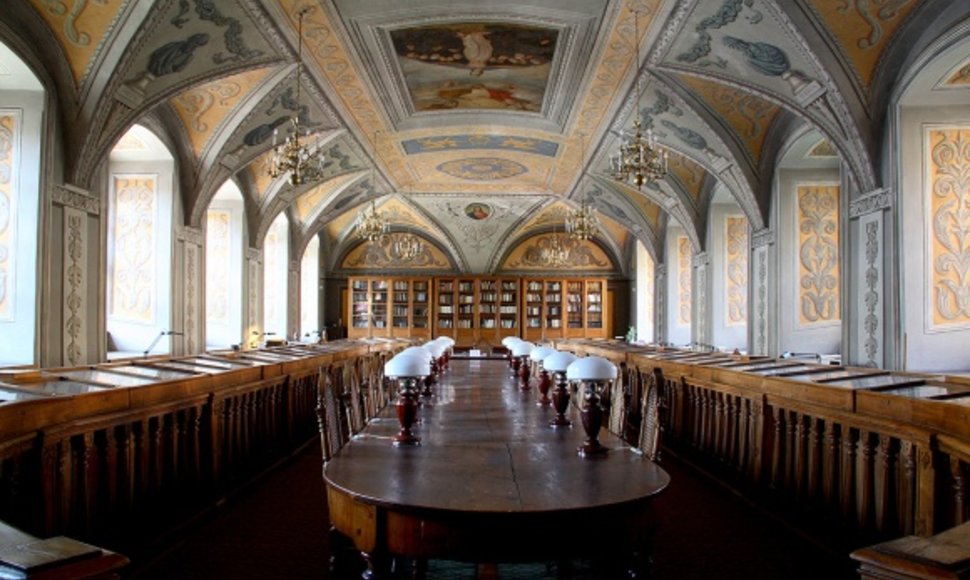We were immersed in the scent of more than 700 years of culture and history. It was a musty, subtle and familiar smell.
It could only be one thing.
Books.
Row upon row of books adorned the walls of the library, gold-lettered, leather-bound gems smiling back at us with what felt like genuine human emotion. Only books could have that power.
We had just finished a tour of the University of Vilnius in Lithuania’s capital city, with particular attention to the library’s Ginutis Procuta collection, which houses more than 3,000 English-language books all donated by one man – Ginutis Procuta. My grandfather.
He has been gone from his homeland for more than 50 years, yet his head and his heart never left Lietuva.
After hearing so much about it, we were finally in Lithuania (or, as we call it, Lietuva), visiting the land of my grandparents, the land they had to flee during the Second World War.
Though I grew up speaking the language and was immersed in the country’s culture, I had always identified myself as Canadian rather than Lithuanian.
My grandfather is a patriotic man and has a fierce love for his homeland. Forced to leave his birthplace in his youth, he spent stints in New Zealand and the United States, then moved to Canada. He began teaching at the University of Ottawa before finally hanging up his hat in Toronto. He has been gone from his homeland for more than 50 years, yet his head and his heart never left Lietuva.
He has channelled this love by donating thousands of books to libraries across Lithuania, though his ties with the University of Vilnius remain the strongest.
Growing up with frequent visits to my grandparents’ house, I was impressed by the abundance of cardboard boxes scattered around their home, destined to become parcels of knowledge for those on the other side of the Iron Curtain.
My grandfather had begun this tradition long before my brother and I were born, at a time when Lithuania was still under the shackles of communism.
It wasn’t until much later that I fit the pieces together and finally understood that his passion for books was only surpassed by his passion for his country.
By sending these books, my grandfather led a personal, literary résistance against the oppressor. He was fighting the system the only way he could: book by book, chapter by chapter.
The tradition continued long after Lietuva had seceded from the Soviet Union, and still does to this day. Even at the age of 78, it’s a habit he can’t shake, an itch he has to scratch. He’s even been known to abruptly end phone calls to go mail a particularly weighty bundle.
Although I’ve never been adept at reading in Lithuanian – on a good day, I can read and write at a mediocre second-grade level – my grandfather has instilled the love of books and of Lietuva in me. This explains why my family’s first trip to our homeland last year, when I was 16 and my brother was 20, was so important to us – but even more so to him.
I wasn’t expecting much of a culture shock. My grandfather had prepped us with more than enough tales of the Old Country, and though my spoken Lithuanian wasn’t stellar, it would surely suffice to converse.
Or so I thought.
My mother had warned us that actually speaking Lithuanian in Lietuva was much harder than it seemed, so it would be acceptable to speak English for the first few days. I was determined to prove her wrong.
It turns out the Lithuanian we grew up speaking was peppered with archaic vocabulary. For example, the word we used for washroom could literally be translated as the place one goes to evacuate.
But upon ordering my first meal in Lithuanian, my voice gave out on me; I rushed through in English, my cheeks as red as the beet soup I was about to eat.
It turns out the Lithuanian we grew up speaking was peppered with archaic vocabulary. For example, the word we used for washroom could literally be translated as the place one goes to evacuate. Our speech was often greeted with curious glances in restaurants.
The culture shock disappeared on our private tour of the University of Vilnius. Turns out it still pays to know the right people.
We craned our necks to the vaulted ceilings, walked by fading portraits in cracked frames, slipped through trapdoors and up spiral staircases.
The director of the library then opened the bolted doors to show us the treasures of our grandfather’s collection. Each book was inscribed in the same handwriting I had grown up admiring: “With best wishes from Canada to the University of Vilnius Library.”
We amused ourselves by reading the titles of manifestos and memoirs from all creeds and cultures. Anything that could enlighten the Lithuanian people was welcomed here, and thus sent by my grandfather.
We found many regifted books we had given him as presents. He’d send them to the university after a rushed read, figuring they needed it more than he did.
So many of my roots were tied to this place without me knowing. It was in my blood and genes, and always would be. My family had had such an impact on this place, and subconsciously, it had had an impact on me. My sense of belonging ran deep under the streets of cobblestones, through the crumbling brick of the Old Town.
It was in that library where I finally discovered my Lithuanian identity. I had always had it. It was there on the library shelves, waiting to be found amid the sea of pages in the Ginutis Procuta collection.












